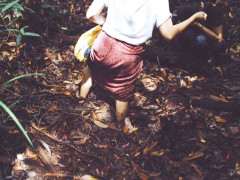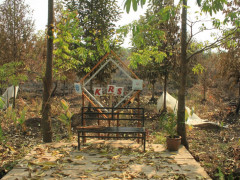Peatland Ancestors
By Admin Pantau GambutContemplating the Fate of Peat and Riau’s Green Commitment Post Omnibus Law

Another issue occurring in 2020, other than Covid-19, is the Omnibus Law which attracts the most attention among Indonesian. A wave of civil protests against the ratification of the Omnibus Law (UU Cipta Kerja) spread throughout most parts of Indonesia. The farmers, fishermen, students, and workers as well as laborers were "forced" to protest in the streets although the COVID-19 pandemic has not been resolved by the government.
In general, they are questioning the issue of workers' welfare which is under increased pressure due to the new articles. Instead of listening to public criticism, the House of Representatives (DPR) and the government did not budge, continued with the discussion, and even accelerated the plenary session. This response resulted in an increased wave of mass demonstrations, which peaked on 8 October.
Similar actions also took place in Pekanbaru, Riau. The issues raised were labor, employment, as well as forestry issues. However, the last issue only received minor exposure.
Some articles from the Environmental and Forestry Protection Law remain applicable but were amended by the Omnibus Law. This will have a significant impact on the forest fires and peat protection effort in Riau.
With regards to forest and peat fires, Riau is the perfect laboratory to observe how regulations and their implementation could cause fatal damages that will linger for decades. Without mentioning the worst incident in 1997, the smoke from the severe 2015 peat forest fires covered almost 80% of Sumatra Island. The damage incurred by the entire Indonesia area is estimated to be Rp 221 trillion, with a damage of almost Rp 20 trillion due to the forest fires in Riau.
Data from the Research and Development Center for Agricultural Land Resources (BBSDPL) shows that there were 3,564,948.39 hectares of peatland in Riau in 2019 or approximately 40% of the total area of Riau Province (8,702,400 hectares). Therefore, peat plays an important social, cultural, and economic role in the community’s lives. Meanwhile, in terms of ecological and climatic functions, peat with its biological richness and ability to absorb carbon emissions can play a role in inhibiting global warming which causes climate change.
Let's evaluate the peatland deforestation data analyzed by Pantau Gambut and Kaliptra Andalas. In 2014-2015, the deforestation of Riau's peatlands was 96,289.17 hectares. This number decreased to 17,371.15 ha in 2015-2016, then further decreased to 6,578.12 ha in 2016-2017. However, peat deforestation significantly increased to 25,447.06 ha in 2017-2018 and continued to increase to 96,483.55 ha in 2018-2019.
On the other hand, the 2016 Riau peat fires affected 66,378.16 ha. The damaged area was reduced to 6,385.24 ha in 2017. However, the increasing number of hotspots in 2018 burned 34,143.03 ha of peatland and the numbers continued to increase to 64,109.09 ha in 2019.
Deforestation and peatland fires in Riau are mostly triggered by land conversion, in which forest or shrubs are converted to monoculture plantations. Therefore, the discussion to analyze the Omnibus Law, which regulates various facets of land and forest-based economic activities, is appropriate for Riau.
Law Number 32 of 2009 concerning Environmental Protection and Management regulates strict liability. Article 88 of the Law states that parties whose actions, business, and/or activities use, generate, and/or involves hazardous and toxic waste management, and/or pose a serious threat to the environment shall be strictly liable for the losses incurred without requiring proof of guilt. The elucidation for the article stated that strict liability does not have to be proven by the plaintiff as the basis for compensation. This principle also implies partiality for the “victim” who may not be able to bear the "expensive" cost of the proof.
For the last four years, this article serves as the main reference used by the government through the Ministry of Environment and Forestry, when suing a number of forestry and plantation companies who had fires in their concession areas. And the strict liability principle is what earns these “wins” for the government and which in the end the government received Rp 315 trillion of forest and land restoration in compensation. The amount is from the nine inkrah lawsuits that were granted by the Supreme Court.
One of the success stories is the Ministry of Environment and Forestry's victory against PT ATGA in the Jambi forest and land fires cases in April of this year. The Director General of Environmental and Forestry Law Enforcement at the Ministry of Environment and Forestry, Ratio Ridho Sani, highlighted the KLHK's lawsuit victory in the PT ATGA forest and land fires case on April 2020.
“This decision demonstrates the application of the dubio pro natura principle and the principle of being prudent in adjudicating cases involving the burden of proof with strict liability. The court decision for forest and land fires case is important because forest and land fires are considered to be extraordinary crimes," said Ratio Ridho Sani, Director General of Environmental and Forestry Law Enforcement, Ministry of Environment and Forestry, when commenting on the decision of the Jambi District Court.
Ironically, the strict liability principle was weakened in the Omnibus Law by eliminating the clause "without proving fault". The law enforcement efforts post the Law will face serious challenges due to this controversial regulation.
Another article in the Omnibus Law that will hinder the forest and peat protection efforts in Riau is the transfer of authority from the local governments to the central government. In terms of spatial planning, Law Number 26 of 2007 stipulates that the forest area shall be at least 30 percent of the watershed area. The purpose of setting the minimum threshold of 30 percent shall be to maintain the sustainability and capacity against the impact of economic dan development activities in the district/city or province. The Omnibus Law has weakened this provision by eliminating the required percentage. The forest areas will decrease faster because the minimum percentage required for protection is no longer enforced due to various investment and development reasons.
The other issue concerns the Environmental Impact Assessment (AMDAL) procedure, which is usually decided at the local government level but now becomes the central government’s responsibility. On the other hand, the AMDAL instrument which used to be “relatively” easy to be accessed by the public, and involves the public in its preparation, is now weakened by the Omnibus Law by limiting public access by only engaging “directly affected communities”. The wider public, who could potentially be directly affected by widespread forest fires haze, can be considered to not have a relevant interest. Therefore, the general public, including NGOs and universities, will not be able to provide input, let alone contest the AMDAL.
Riau, whose governor has pledged sustainable development through the jargon of “Green and Dignified Riau”, should be nervous about the Omnibus Law. Unfortunately, we don't see this concern. Instead of expecting the Riau Provincial Government to reject the Omnibus Law, Governor Syamsuar should immediately finalize the Green Riau concept. In the second year after making his campaign promises, I think there is still time to fulfill these promises and discuss them publicly and openly.
The Omnibus Law has now been ratified and will seriously impact the peat protection efforts, we need to study this policy and identify any regulatory loopholes that can be strengthened in the Green Riau concept. The Riau people will definitely support all efforts to protect the peatlands and avoid the risk of being exposed to haze. Wallahu A'lam.
*The author is the Coordinator of Simpul Jaringan Pantau Gambut Riau and Director of Kaliptra Andalas
** THIS WRITING WAS PREVIOUSLY PUBLISHED ON THE ANTARA ONLINE MEDIA PORTAL ON 16 NOVEMBER 2020 **



